Murder most revealing: L.Corporal Haleem’s death & the burial of truth
by Azra Naseem
Last Sunday night Lance Corporal Adam Haleem was stabbed to death on the island of Kaashidhoo. He was en route to duty and in full uniform. He died from multiple stab wounds just after midnight. He was 26 years old, and the father of a son not yet a year old.
Before the young policeman’s body was cold, his death had become a political opportunity for many. Politicisation of life and death is not a new phenomenon in the Maldives. It was on the rise before the change of government on 7 February. But the extent to which the current ‘Unity Government’ of Dr Mohamed Waheed Hassan Manik is going, to squeeze every drop of political juice from the death of Lance Corporal Hameed, is a revolting spectacle to behold.
It was Dr Waheed himself who set the ball rolling.
Strongly condemn the killing of a policeman while on duty. Enough of hate mongering against officers of the Law.
— Mohamed Waheed (@DrWaheedH) July 22, 2012
What was this about hate-mongering? What did he mean? Was the policeman’s murder linked to the current political unrest? That was certainly the inference, as he reiterated shortly after:
No excuses to kill anyone let alone policemen on duty. Shame on cowards hiding behind anonymity and inciting violence.
— Mohamed Waheed (@DrWaheedH) July 22, 2012
One of the first political figures to put into words what Waheed insinuated was MP for Kaashidhoo area Abdulla Jabir. He told the Sun within an hour of the news breaking:
[I] condemn this murder in strictest words. It is sad that such incidents are increasing. The reason for this is the continued actions by MDP [Maldivian Democratic Party] to spread lies about the police and create anger against them among the people.
Sun also reported that ‘Private MP’ Ahmed Mahloof (PPM), less than two hours after the news broke, said:
What we have seen tonight is the democracy that MDP talks about. The democracy we have seen is the one which calls to attack the police. I condemn this. Nasheed and MDP must take responsibility for this.
Several others were jostling for space on the bandwagon. Home Minister Mohamed Jameel Ahmed said this:
My thoughts and prayers are with the family of police officer stabbed to death this evening at Kaashidhoo
— Mohamed Jameel Ahmed (@MJameelAhmed) July 22, 2012
Murder of Police Officer came after continuous attack on Police Force by MDP, calling entire Police Force traitors
— Mohamed Jameel Ahmed (@MJameelAhmed) July 22, 2012
Here are some significant others.
Human Rights Commissioner Mariyam Azra, too, appeared convinced that what the Unity Government and its supporters were saying was indeed true. Within the hour she had this to say:
Very sad that a policeman has been killed like this. Nobody should speak in ways that incite hatred against another.
Politics of death
The death of a policeman—especially when hostilities between anti-government protesters and the security forces are at an all time high—is a potent event, laden with political consequences. For the Unity Government it became the ‘evidence’ with which to prove a ‘truth’ they have been peddling from the beginning: MDP is a violent political group determined to regain power at any cost.
This strategy for criminalising dissent and constructing all supporters of MDP as ‘terrorists’ who are also the cause of all the social unrest of today, has been at the forefront of this government’s efforts to legitimise itself since day one.
The government was helped in its campaign to exploit the young policeman’s death by the police themselves. Lance Corporal Haleem died at around quarter past midnight on Sunday night. Between then and mid-afternoon Monday—despite being in possession of all facts surrounding the murder—the police did not make public any details surrounding it. The only thing said was ‘a policeman has been murdered,’ and where.
This left a long Speculation Window in which the Unity Government could air as fact its message that Lance Corporal Haleem had been murdered by an MDP thug, driven to it by calls for violence against the police by MDP leaders.
During the midnight hours, knowing that most people stay up late during Ramadan, key figures in the Unity Government saturated the media with the message. Jumhooree Party (JP) leader Gasim Ibrahim appeared on his Villa TV with Kaashidhoo MP Jabir and JP’s President Dr Didi to discuss ‘the problem of MDP’s continuous incitment of violence against the police.’
They intertwined news of the policeman’s death with the narrative of ‘MDP violence against the police’ so often and with such conviction that by the time the police finally revealed more facts, most people—except the accused—were convinced MDP was behind the policeman’s murder. Here’s a tweet that encapsulates the sentiments of government supporters the following day.
I hate these MDP sluts.. Why the hell did they kill a young police man whose even a father of 2 children.. I hate em! They r HEARTLESS!!
— 💗 (@NoodleWaffle_) July 23, 2012
Dissemination of the message did not stop at the country’s borders. In fact, when spread to the international community, the Unity Government didn’t bother with the insinuations. It just came straight out and pointed the figure at MDP. Before Monday morning, the President’s Office Spokesperson, Masood Imad, had told the AFP in Colombo:
The MDP instigated the attack on policemen at Kaashidoo and one was stabbed to death.
Here’s how a Sri Lankan newspaper ran the story the next morning:
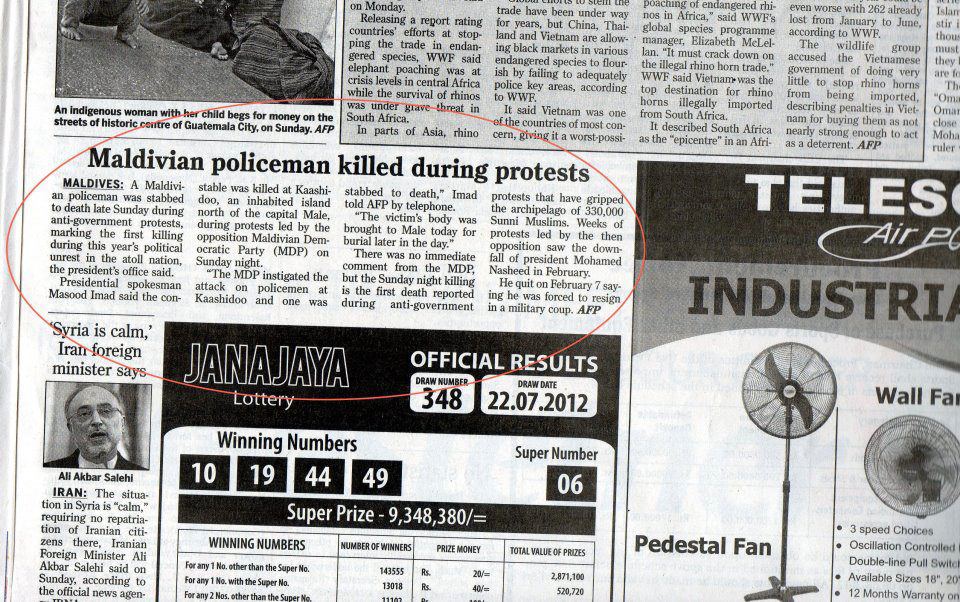
Whither the truth?
The truth of the matter, when details began to come out on Monday, was very different. Lance Corporal Haleem was killed by a criminal he had investigated for about a year, and was about to arrest. The murder was straightforward, and Mohamed Samah, the 22-year-old culprit from the same island, was arrested at the scene. There was an eye-witness and several people, including the police, were on the scene within seconds.
The subsequent scramble to pinpoint the political party to which the accused belonged was ugly. And it was a malaise that affected not just the Unity Government but the general population in its majority. It was as if the violent death of a young man would only begin to matter once the murderer’s political affiliation was established. His connections with various key figures in different political parties were discussed; his identity card number was keyed into the Elections Commissions website; his membership of one party thus established without doubt—only for that party to come out and say: “There are many MDP members who signed up to other parties by mistake.”
Seriously.
In a ‘functioning democracy’, as Dr Waheed describes the Maldives, the facts of Lance Corporal Haleem’s death would have required a formal retraction. And, at the very least, it would have elicited an apology to the MDP for very serious wrongful accusations made against it. But that is not what happened, for it was not Lance Corporal Haleem’s death that was important but the concurrent narrative of MDP’s violence that it was used to construct. Under the circumstances, truth was irrelevant.
Thus the political abuse of Lance Corporal Haleem’s body continued apace.
After the condemnations came the heavily publicised State funeral. Of course, the fallen must be honoured. Policemen put their lives at risk protecting society, and we should appreciate that, especially so when they die on duty. But was the public spectacle put on by the Unity Government and Maldives Police Service really necessary?
It is not part of Maldivian culture to hold ostentatious, loud, photographed and televised funerals. We are humble and simple in our bereavement. But, pictures of Lance Corporal Haleem’s coffin being carried to Islamic Centre on the shoulders of sombre looking policeman were splashed across the media. As were pictures of various key Unity Government figures consoling the family, looking appropriately grieved, and even praying. Faith, like death, reduced to a photo opportunity.
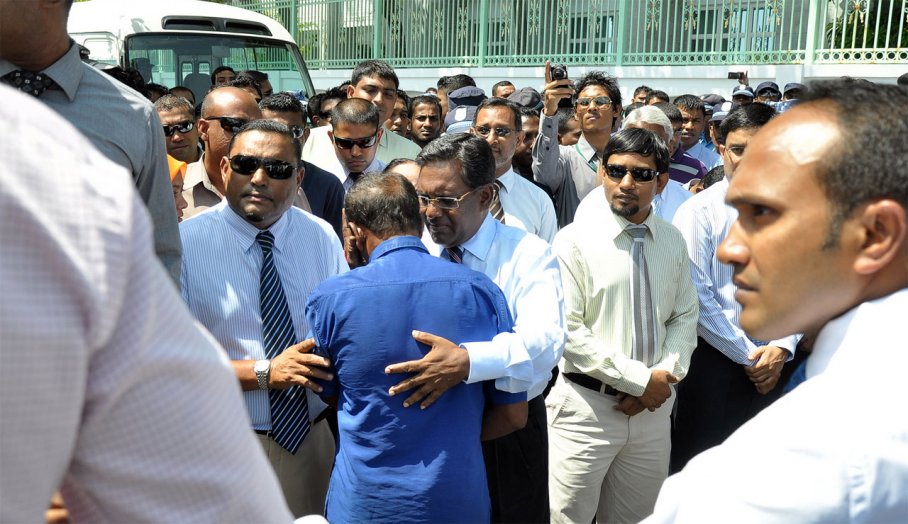
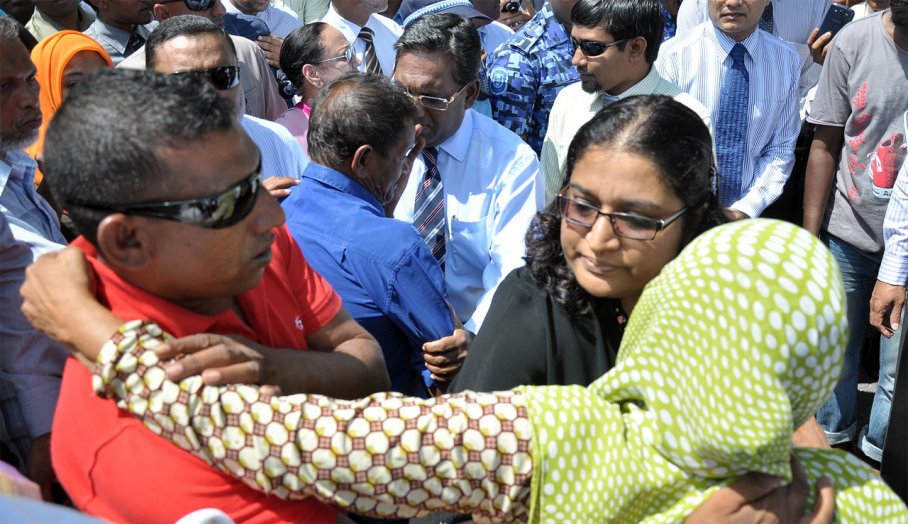


[In a slight digression: I could not help but notice Lance Corporal Haleem’s distraught mother photographed at the burial ground paying her respects. I know several mothers, wives, daughters and sisters (myself included) who have desperately wanted it to be otherwise. But it has always been maintained that a woman cannot partake in the burial. What was it about this occasion that allowed the bending of a seemingly inflexible Islamic rule?]
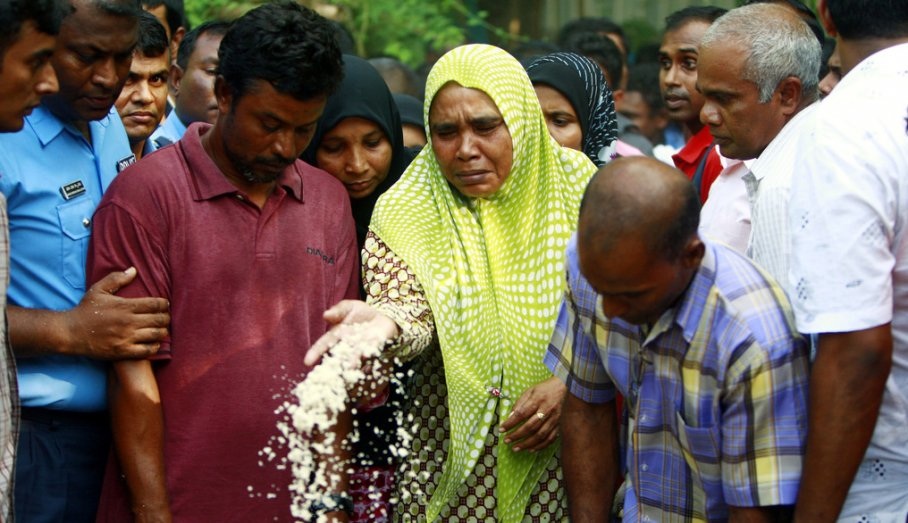
Retaliation against the wrongfully accused
As the day passed, the rhetoric of MDP’s violence against the police was only ratcheted up, not lowered. Now the Unity Government’s efforts were on making people forget the truth. It seems as if the fact of Lance Corporal Haleem’s death has been buried with him. What remained of concern was the accompanying narrative—MDP is deliberately inciting violence against the police and must be stopped.
Thus the Maldives Police Service began ‘retaliation’ against MDP for a crime it had nothing to do with. Chief among several actions taken to avenge Lance Corporal Haleem’s murder was the ‘leaking’ of a telephone conversation between Nasheed and MDP Mariya Didi, one of his closest allies and friends.
In the 29 March conversation, Mariya is heard updating Nasheed about police violence and use of pepper-spray against protesters resisting their dismantling of Usfasgan’du [MDP’s protest camp] that day. She asks for Nasheed’s advice, and he replies:
There’s not much we can do. I don’t know. What is there to do? I think [we] need to get people out to fight if we can get them. If we can get people to fight, get them out. It’s very clear to me, I think we need to fight back. If we can get people to fight. Find kids from Male to fight the police.
Mariya laughs. Not the response one would expect from a person who thinks she has just been assigned the task of recruiting a gang of thugs to take on the national security forces. Regardless, the police thought it prudent to release the audio clip.
For what purpose?
It was certainly not aimed at calming tensions or to make real the rhetoric of reconciliation. Nasheed’s supporters are unlikely to accept the private conversation between him and Mariya as evidence of his alleged brutality. For them, his commitment to non-violence was proven beyond doubt when not just the MDP-affiliated Coup Report but also the so-called CONI Timeline documented Nasheed’s unequivocal refusal to use weapons against the mutinying police, or anyone else, on 7 February.
The only purposes the audio clip served was to harden government supporters’ dislike and mistrust of Nasheed, and to fortify government’s efforts to construct Nasheed as the cruel leader of the violent political organisation that is said to be MDP. To support their claim that MDP leaders are all characterised by political extremists prone to violence, they have also unearthed statements made by key MDP figures encouraging—wrongly so—retaliation against the police for their brutal violence against them during the events surrounding the transfer of government. Whether or not their words bear any relation to the murder of the policeman, once again, is of the least consequence. What it did beautifully was fit the government narrative.
What use to make of the audio clip, which the police has been in possession of since March, was decided shortly after Lance Corporal Haleem’s murder and long before facts of his killing were made public. Home Minister Jameel hinted at it on the night of the murder itself:
Evidence available to police exposes MDP top leadership calling for violence against police force
— Mohamed Jameel Ahmed (@MJameelAhmed) July 22, 2012
The ‘evidence’, with the allegation, is continuing to play across the media—mainstream and social–since then.
https://twitter.com/AhmedMahloof/status/227410012585205761Before they brought foreigners and shot them dead, now getting Maldivians to stab them…Bravo to the democracy Anni is bringing.
https://twitter.com/AbbasRiza/status/227476176132767744 https://twitter.com/AbbasRiza/status/229158956847734784Police officers please take good care of yourself and try to protect your life mdp mob is on their way now. Shame less than 6yrs of burial
— Mohamed Maleeh Jamal (@maleehjamal) July 23, 2012
The poster with the last Tweet from President’s Spokesperson Abbas Riza reads:
6 February Massacre
Main reasons why a massacre was desired:
—to declare a state of emergency
—to abolish the JSC and give MDP the power to appoint judges
—to arrest the leaders who stepped up to defend Islam and the Constitution
—to hand MPL (Maldives Ports Limited) to a company of which India’s GMR is a shareholder
These are not the words and actions of members of a government eager to calm the political and social turmoil afflicting Maldives today. On the contrary, they are intended to cause the opposite effect.
If the Unity Government were serious about reconciliation in the five long months gone, it would have taken due action against members of the police who mutinied. It would not have given them promotions instead. It would not have appointed as leaders of the security forces men like Mohamed Nazim, Abdulla Riyaz and Mohamed Fayaz, men who the whole country saw playing a key role in the change of government on 7 February. The seeds of public mistrust of the police were planted on that day, and on 8 February. And they grow and mushroom with every day that passes without this government’s acknowledgement of the these facts.
There can be no reconciliation without the truth.
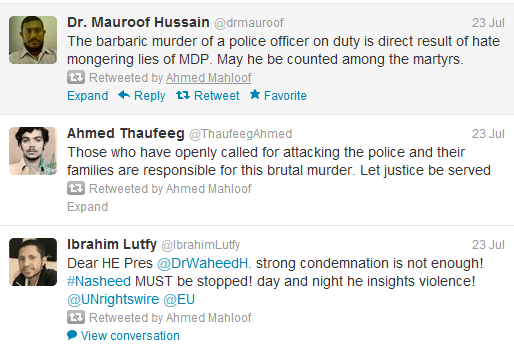
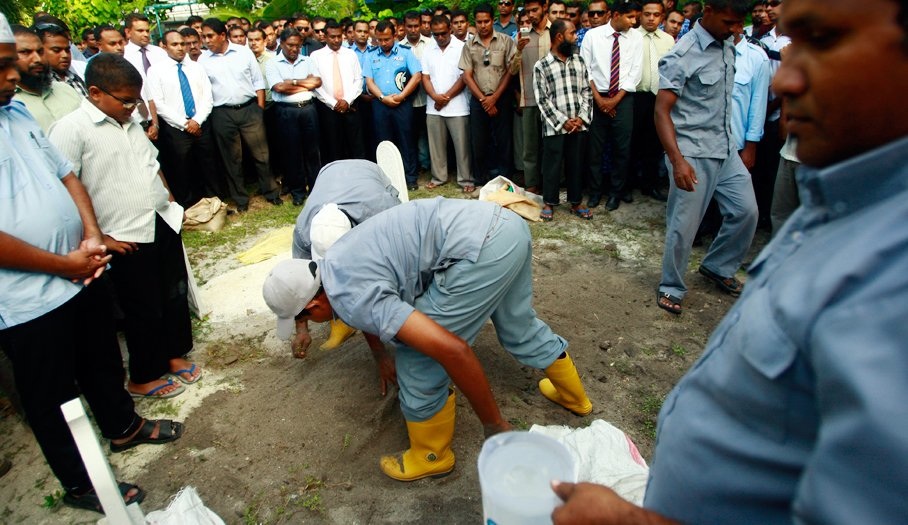
26 comments